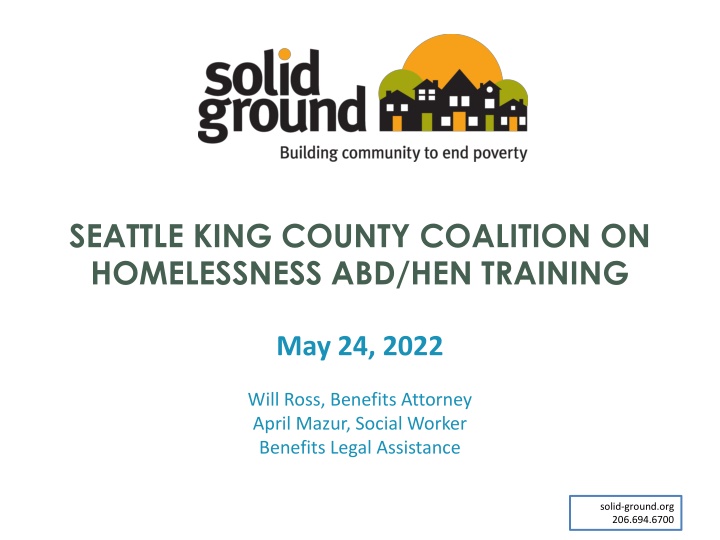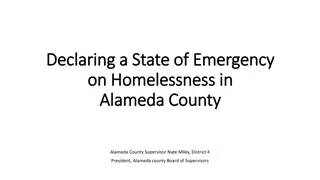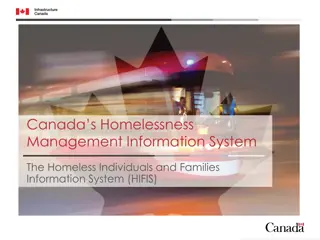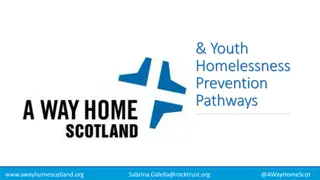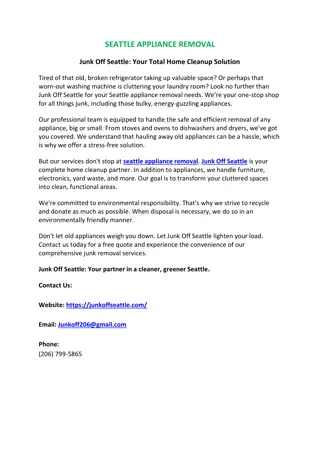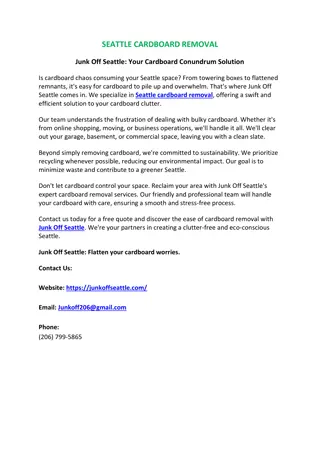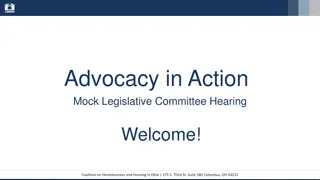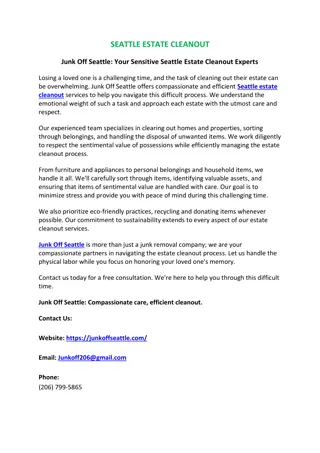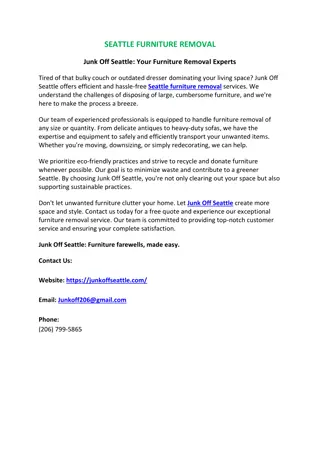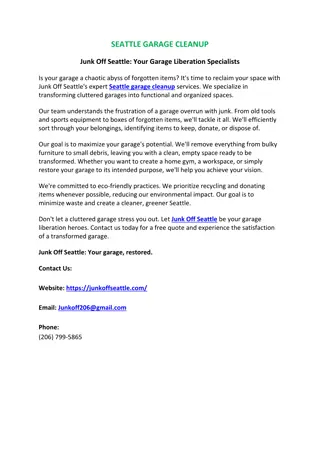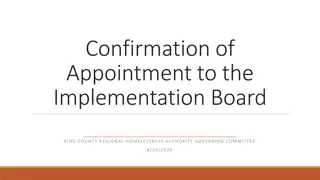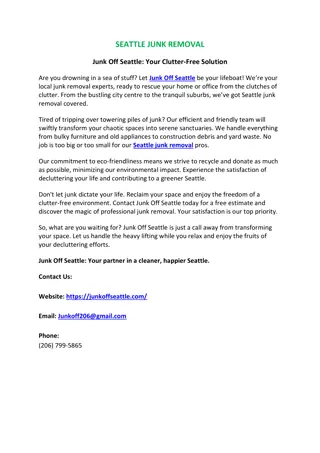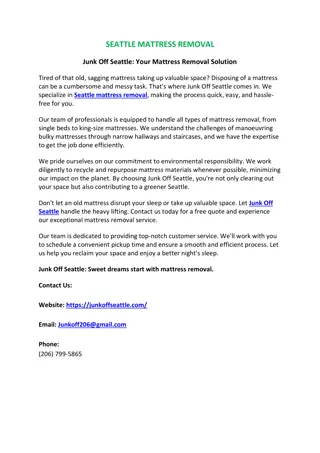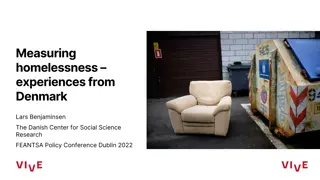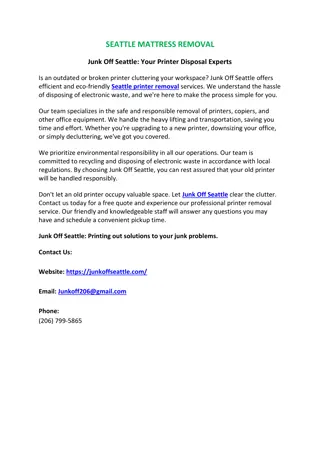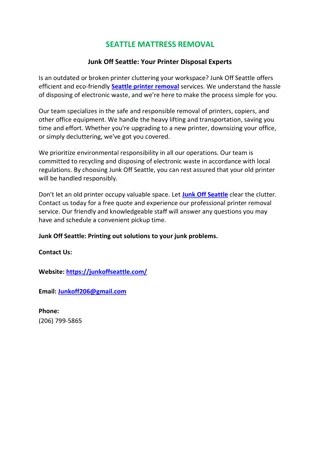SEATTLE KING COUNTY COALITION ON HOMELESSNESS ABD/HEN TRAINING
The SEATTLE.KING.COUNTY.COALITION.ON.HOMELESSNESS.ABD/HEN.TRAINING on May 24, 2022, features Will Ross, Benefits Attorney, and April Mazur, Social Worker, providing Benefits Legal Assistance and valuable insights.
Download Presentation

Please find below an Image/Link to download the presentation.
The content on the website is provided AS IS for your information and personal use only. It may not be sold, licensed, or shared on other websites without obtaining consent from the author.If you encounter any issues during the download, it is possible that the publisher has removed the file from their server.
You are allowed to download the files provided on this website for personal or commercial use, subject to the condition that they are used lawfully. All files are the property of their respective owners.
The content on the website is provided AS IS for your information and personal use only. It may not be sold, licensed, or shared on other websites without obtaining consent from the author.
E N D
Presentation Transcript
SEATTLE KING COUNTY COALITION ON HOMELESSNESS ABD/HEN TRAINING May 24, 2022 Will Ross, Benefits Attorney April Mazur, Social Worker Benefits Legal Assistance solid-ground.org 206.694.6700
Before we begin Remember that public benefits laws and policies are steeped in systemic racism. http://theconversation.com/how-racism-has-shaped-welfare- policy-in-america-since-1935-63574 https://slate.com/human-interest/2018/06/trump- administrations-fixation-on-work-requirements-for-snap- benefits-is-part-of-a-long-racist-policy-history.html Be aware of the impact of casual racism and stereotypes when speaking about recipients of public benefits. https://www.npr.org/sections/codeswitch/2018/06/08/61668 4259/why-more-white-americans-are-opposing-government- welfare-programs https://www.huffingtonpost.com/entry/americans-welfare- perceptions-survey_us_5a7880cde4b0d3df1d13f60b solid-ground.org 206.694.6700
Aged, Blind, or Disabled (ABD) Aged, Blind, or Disabled (ABD) is a state funded program that provides cash assistance and a referral to the Housing and Essential Needs (HEN) program to eligible low-income individuals who are age 65 or older, blind, or determined likely to meet Supplemental Security Income (SSI) disability criteria based on an impairment(s) expected to last at least 12 consecutive months. ABD provides a maximum monthly cash grant of $197 for a single individual or $248 for a married couple. ABD recipients are also eligible for assistance applying for SSI benefits (SSI Facilitation) solid-ground.org 206.694.6700
Who is Eligible for ABD? Reside in the state of Washington; Are age 65 or older, blind, or have a long-term medical condition that is likely to meet federal disability criteria; Are at least 18 years old or, if under 18, a member of a married couple; Meet income and resource requirements; and Meet citizenship / alien status requirements. solid-ground.org 206.694.6700
What are the income and resources limited for ABD Assistance Unit Size Monthly Income Limit 1 $339.00 2 $428.00 Resource limit is $6000.00 in liquid assets solid-ground.org 206.694.6700
What income is counted when determining income limits for ABD? Earned Income Earned income money you get from working. Only 50% of gross earned income (before taxes) is considered against the income limit for ABD recipients. This includes: (a) Wages; (b) Tips; (c) Commissions; (d) Profits from self-employment activities as described in WAC 388- 450-0080; and (e) One-time payments for work you did over a period of time. (2) For cash assistance, if you work for something other than money, such as your rent, this is also counted as earned income. Unearned Income Unearned income is income you get from a source other than employment or self-employment. Some examples of unearned income include, but are not limited to: (a) Railroad retirement; (b) Unemployment compensation; (c) Social Security benefits (including retirement benefits, disability benefits, and benefits for survivors); (d) Time loss benefits as described in WAC 388-450-0010, such as benefits from the department of labor and industries (L&I); (e) Veteran Administration benefits; or (f) Paid family and medical leave benefits. solid-ground.org 206.694.6700
Veterans with 10% disability may be eligible for ABD since their income is below the income limit for ABD Disability Rating Monthly VA Payment 10% $144.14 20% $284.93 solid-ground.org 206.694.6700
Brief note on ABD and Couples Do spouses have to apply for ABD or can only one apply on their own? They both are not required to apply, so one spouse can apply on their own Do both spouses have to be ABD eligible? Only if they are applying as a couple If only one spouse is applying for ABD, is the income of the other spouse included against the income limit Yes for the most part. There are deductions and a formula to determine how much of the spouse s income is counted. Who is in the assistance unit for aged, blind, or disabled (ABD) cash assistance? (1) If you are an adult that is aged, blind, or likely to be disabled as defined in WAC 388-400- 0060 and 388-449-0001, you can be in a ABD cash assistance unit (AU); (2) If you are married and live with your spouse, we decide who to include in the AU based on who is aged, blind, or likely to be disabled: (a) If you are both aged, blind, or likely to be disabled as defined in WAC 388-400-0060 and 388-449- 0001, we include both of you in the same AU. (b) If only one spouse is aged, blind, or likely to be disabled, we include only the aged, blind, or likely to be disabled spouse in the AU. We count some of the income of the spouse that is not in the AU as income to the AU under WAC 388-450-0137. solid-ground.org 206.694.6700
What are the disability requirements for ABD? "Disabled" means the inability to engage in any substantial gainful activity by reason of any medically determinable physical or mental impairment(s) which has lasted or can be expected to last for a continuous period of not less than twelve months with available treatment or result in death. "Physical impairment" means a diagnosable physical illness. "Mental impairment" means a diagnosable mental disorder. Any diagnosis of or related to alcohol or drug abuse by itself is not considered a mental impairment for purposes of determining ABD eligibility. You aren't eligible for ABD cash benefits if you are disabled primarily because of alcoholism or drug addiction. You can have an alcohol or drug addiction and still be eligible for ABD if there is another reason for your disability in addition to the addiction. solid-ground.org 206.694.6700
How is a disability proven? Evidence from healthcare professions who have diagnosed the ABD applicant/recipient with a physical or mental impairment. You can ask that DSHS provide you with the forms the healthcare provider needs to complete or you can obtain the forms online. Not every healthcare professional can provide the diagnosed that is required for ABD eligibility so it is important that you know what category of healthcare professionals DSHS requires to determine if an applicant/recipient is disabled. solid-ground.org 206.694.6700
Only the following health care providers can diagnosed a physical impairment For a physical impairment, a health professional licensed in Washington state or where the examination was performed: Medical doctor (MD); Doctor of osteopathy (DO); Doctor of optometry (OD) for visual disorders; Doctor of podiatry (DP) for foot and ankle disorders; Physician assistant (PA) for impairments within their licensed scope of practice; Advanced registered nurse practitioner (ARNP) for impairments within their licensed scope of practice; Audiologist for impairments of hearing loss, auditory processing disorders, and balance disorders within their licensed scope of practice; and Qualified speech-language pathologist, for purposes of establishing speech or language impairments. solid-ground.org 206.694.6700
Only the following health care providers can diagnosed a mental impairment For a mental impairment, a health professional licensed in Washington state or where the examination was performed: Psychiatrist; Psychologist; Advanced registered nurse practitioner (ARNP) for impairments within their licensed scope of practice; Physician assistant (PA) for impairments within their licensed scope of practice; and School psychologist or other licensed or certified individual who performs the same function as a school psychologist in a school setting for impairments of intellectual disability, learning disability, or borderline intellectual functioning. solid-ground.org 206.694.6700
The following healthcare providers cannot make a diagnosis of impairment to prove eligibility based on a disability (a) Physician treating you for a mental impairment; (b) Clinical social worker; (c) Mental health professional (MHP); (d) Naturopath; (e) Chiropractor; (f) Physical therapist; and (g) Chemical dependency professional (CDP) However once there is a diagnosis made by a health professional in the previous slides, these healthcare providers can explain how the impairment impedes the ability to work. solid-ground.org 206.694.6700
What is a Medical Diagnosis? Medical diagnosis is the process of identifying a disease, condition, or injury based on the signs and symptoms presented. A Medical diagnosis is based on: The patient s medical history Physical or mental examination Lab Results such as blood or urine testing Testing such as hearing, vision, blood pressure Objective testing/examination: X-Rays, MRI A medical diagnosis has been made when the medical provider or records provide an explanation for the patient s symptoms or behavior such as the patient has PTSD which is causing acute anxiety and panic attacks or patient s pain is due to a herniated disk. The medical provider will outline the evidence that supports these conclusions. Look for these conclusions and summaries to determine if a medical diagnosis has been made. solid-ground.org 206.694.6700
What to look for in the medical records to determine if you have enough to establish a disability A physical or mental impairment diagnosis that significantly impacts the ability to perform everyday task Impairment should affects things such as: Socializing with others or follow directives To walk, stand or sit for prolong periods of time Capacity to comprehend, see, hear, communicate Ability to lift Longevity Other tasks associated with work or performing daily tasks The impairment will last for at last 12 months for ABD, 90 days for HEN There is objective evidence to support the diagnosis and conclusions Diagnosis is done by acceptable medical provider listed in previous slides solid-ground.org 206.694.6700
Other places to find diagnosis School records is a good place to see if a learning disability or mental health diagnosis has been made. VA records, particularly if the client has a VA disability classification Your own observations of the client, meaning your observations may help in finding the correct diagnosis. Although these records may not have everything you need to establish a disability, it is a good starting point. solid-ground.org 206.694.6700
Physical FunctionalEvaluation 1. Payment fora general or comprehensivephysical evaluation is contingent upon receipt ofavailable chart notes from within the past six months, aswell as supportingevidence including lab results, pathology reports, diagnostic imaging reports, and range ofmotion studies. You must beenrolledin ProviderOne to claim reimbursements for these services. As you examine this patient,please evaluateall medical conditions that may limit theirability to work.You are not limited to evaluating the presenting condition(s). Youare notrequiredto complete anyspecial test of functional capacity to render your professionalmedicalopinion onthisform. Confidentiality: Theinformation you provideis subject to WashingtonState Public Disclosure laws andmay be released to the client upon request.DSHSdiscloses no further information without the writtenconsentofthe individual to whomit pertains oras otherwisepermitted by state law. 2. A. Client Information NAME BIRTH DATE CLIENT IDENTIFICATIONNUMBER B. Authorization to Release Information I authorize information to the Department of to release the following EXAMINING PROFESSIONAL S NAME Social andHealth Services (DSHS). This release includes thecontentsofthis evaluation as well as diagnostic testingor treatment information concerningmental health, alcohol ordrug use , sicklecell disease, and sexually transmitted disease, includingHIV/AIDS (Chapter 70.02 Revised Code of Washington (RCW)(42 Code ofFederal Regulations (CFR)Part 2). This authorization is validforoneyear or until (date). I may revokeor withdrawthis authorization inwriting at anytime. I understand that the information providedto DSHS may bere-disclosedonlywith a valid authorization from meorif required by law. CLIENT S SIGNATURE DATE C. Subjective Chief complaintsand reported symptoms: PHYSICAL FUNCTIONAL EVALUATION DSHS 13-021 (REV. 06/2020) Page 1
Temporary rule changes due to Covid Pandemic On February 29, 2020, Gov. Jay Inslee declared a statewide emergency due to the spread of coronavirus (COVID-19), and the governor has continued to issue further orders limiting government activity. In response to the ongoing outbreak of the COVID-19 virus in Washington state, DSHS made policy and service delivery changes to help meet the needs of clients. Listed below are changes related to ABD. These modifications will be phrased out when the state of emergency order is lifted by the Governor. DSHS will not enforce sanctions due to the participant s inability to follow required treatment, vocational rehabilitation, and/or SSI requirements due to COVID pandemic. NOTE: DSHS can still ask for this information but if you are having trouble following through with these requirements due to the pandemic you should explain that to DSHS as soon as possible. DSHS extended eligibility reviews and mid-certification reviews. Suspend or waive eligibility review requirements detailed in WAC 388-434- 0005 for the ABD program. Prior to emergency cases are subject to review at least every twelve months or sooner if the Department determines there is a need to do so. Suspend or waive mid-certification review requirements detailed in WAC 388- 418-0001 for the ABD program. Prior to emergency: For a mid-certification review client is sent a form in the fifth month of their certification or review period. They must complete their review by the 10th day of month six solid-ground.org 206.694.6700
Temporary rule changes due to Covid Pandemic, Cont. Emergency Rules to prove your disability. DSHS may accept evidence that is more than 90 days old or waive this requirement in its entirety. Usually to show your diagnosis you need evidence from an MD, PA, ARNP, or Specialist (called acceptable medical sources ) BUT DSHS now may accept evidence of your diagnosis from a treating medical source (a) Physician treating you for a mental impairment; (b) Clinical social worker; (c) Mental health professional (MHP); (d) Naturopath; (e) Chiropractor; (f) Physical therapist; solid-ground.org 206.694.6700
Application Process Fill out DSHS Application form 14-001 for Cash assistance. You only need to apply for Cash benefits for ABD, and when they assess the client s application they will screen for HEN. Fax or mail to DSHS Can also apply online at washingtonconnection.org Will need to create an account, username and password Will need email address to receive verification code Client will need to complete a financial interview with DSHS to confirm the information that was submitted on their application. Recommend following up with the department a couple days after the application is submitted. If you complete the application online, you can call the same day for the interview. Collect as many medical and personal records that support the disability claim. They should be no older than 6 months or DSHS will not accept them. Note: Medical records must be within 90 days to determine disability, except when this time period requirement is waived during an emergency. solid-ground.org 206.694.6700
Financial Interview Call DSHS customer Service 877.501.2233 DSHS accepts interview calls from 8am to 3pm Monday through Friday. If a client is calling in for themselves, recommend calling in as early as possible to avoid long hold times. Client can also go into the Community Service Offices to complete the interview as they are now open to the public. CSO s are also open for interviews from 8am 3pm They will issue EBT Cards until 4pm solid-ground.org 206.694.6700
What happens when ABD is approved? Will be approved for ABD for 24 months Will be required to apply for SSI If approved for SSI, ABD recipients are required to repay the state for all money received from the ABD by signing and returning DSHS 18-235 form to DSHS. Repayment is done as a reduction from their retroactive SSI payment. Must report change in resources if it puts recipient over the resource limit of $6000.00 Must report all changes in income by the 10th day of the month following the change in come. For example if recipient starts a part time job in April and received their first paycheck in April, they must report that change by May 10. The change occurs the month they receive the income, not the month they start working. May be required to participate in treatment such as mental health or substance abuse solid-ground.org 206.694.6700
When does eligibility for ABD benefits end? The maximum period of eligibility for ABD cash is twenty-four months before recipient must provide additional medical evidence. If they remain on ABD cash at the end of the twenty-four month period, their eligibility determined by their new/current medical evidence. If their application for SSI is denied: DSHS will review their eligibility for the ABD cash program; Will stop their benefits if they do not provide proof they filed an appeal with SSA within sixty days of a SSI denial for not being disabled. Will stop their benefits after the final decision on their application for SSI/SSA benefits or if they fail to follow through with any part of the SSI/SSA application or appeals process. If there is a SSI denial, client may still be eligible for ABD if they can prove a new or worsening condition since the time of the medical records/evidence that SSA relied on to decide the denial of the SSI claim. Failure to sign and return reimbursement form DSHS 18-235 Exceeding the income or resource limit, often due to gifts from friends and family. There are ways to avoid this pitfall. Failure to participate in mental health or substance abuse treatment if recommended. Often the degree of the mental health disability may make participation in treatment nearly impossible. BLA can help address this issue. Failure to provide proof of SSI application Approval of SSI benefits solid-ground.org 206.694.6700
Common reasons why an ABD application may be denied The most common reason is the failure to prove the disability will last for at least twelve months or the lack of objective evidence (X-Rays, lab test results, MRIs, Ultrasound) to support the physicians conclusion of disability. Often Medicaid tells clients that some of these test, like MRIs, will not be covered so the client never has them done. REMEMBER DSHS IS REQUIRED TO PAY FOR TESTING THAT IS NECESSARY TO ESTABLISH ELIGIBILITY Mental health evaluations done by DSHS contract providers who have demonstrated implicit bias in their evaluations. The conclusion you will often find in these evaluations is malingering (making it up). One study claims nationally this diagnosis is reach 60% of case involving patients seeking disability based on PTSD when the government provides the evaluator It is best to use one s own mental health profession, particularly one who works with communities of color and marginalized communities. Physical and Mental Health Function Evaluation Forms (DSHS 13-021 and DSHS 13-865) not completed correctly. Familiarize yourself we these forms so you can assist the client and provider in getting the forms completed correctly. Engaged in Substantial Gainful Activity (SGA) which includes activity that a person would normally be paid to perform. Medical Evidence not received within 90 days of application Medical Evidence is not current, more than 90 days old. solid-ground.org 206.694.6700
What to do if an application is denied or benefits are terminated Request a hearing Call the BLA intake line for legal assistance or Reapply solid-ground.org 206.694.6700
Requesting a Hearing Generally 90 days to request a hearing from the adverse action (termination, denial, or change in benefits). To receive continued assistance while the hearing is pending a hearing must be requested within 10 days of the date on the DSHS notice. If the tenth day falls on a weekend or holiday, you have until the next business day to ask for a fair hearing to get continued benefits. If the tenth day happens before the end of the month, you have until the end of the month to ask for a fair hearing to get continued benefits. Please note if the client loses their hearing DSHS, will request they repay two months of the ABD they received while waiting for the hearing. You should inform your clients about this before requesting continued benefits. Office of Administrative Hearings for King County call the Seattle Office at 206.389.3400 The request can be in writing or calling either OAH or DSHS or going in- person to DSHS. solid-ground.org 206.694.6700
When to Reapply You should reapply if any of these is true: You think DSHS correctly denied you but your situation has since changed. You have more information that might change their decision. Your worker or supervisor will only consider it if you reapply. You can reapply while also trying to use the new information in your hearing. The approval of a new application probably will not go back to the date you first applied or date DSHS first denied you. Copied from WashingtonLawHelp solid-ground.org 206.694.6700
How to Avoid Benefit Pitfalls Request an Equal Access Plan DSHS must provide Necessary Supplemental Accommodations to all persons with a mental, neurological, physical or sensory impairment or other limitation that prevents them from accessing or maintaining benefits in the same way that an unimpaired person would Designate an Authorized Representative An authorized representative is someone you designate to represent you when you apply for or receive benefits with DSHS or HCA. The individual or organization is authorized to act on behalf of the client for eligibility purposes. solid-ground.org 206.694.6700
How to Avoid Benefits Pitfalls, cont. Report changes in circumstances Report required changes in household income, household size, or resources by the 10th day of the month following the change. For changes in income, the date a change happened is the date you receive income based on this change. Contact DSHS or BLA if you are in doubt about what needs to be reported. solid-ground.org 206.694.6700
What to Report to DSHS for ABD Changes to report for ABD benefits: You move or someone moves out of your home Your total gross monthly income goes over the payment standard for ABD cash(WAC 388-478-0033), which $197.00 a month for a single person and $248.00 for a married couple. You have liquid resources of more than $6000 You have a change in employment WAC 388-418-0005(1)(a) solid-ground.org 206.694.6700
When reporting changes for ABD benefits is not required If household has a change of circumstances and are not required to report under WAC 388-418-0005, then do not need to contact DSHS about the change. However, if you tell DSHS about the change, they will take action based on the new information. Contact BLA if you have any questions about what to report. WAC 388-418-0007(1) solid-ground.org 206.694.6700
Equal Access Plans Necessary Supplemental Accommodations (also called Equal Access) DSHS is required to screen and identify individuals needing extra help to access or maintain services because of their disability, learning disability, or literacy issues. DSHS identifies clients who need NSA services if: The client tells DSHS that they need accommodations. DSHS observes the client as having cognitive limitations, whether or not they have a disability, which would limit the client s ability to understand NSA services or access DSHS services. DSHS staff are responsible for identifying clients who may need NSA services. Services can include (but aren t limited to): Arranging for or providing help to complete and submit forms to DSHS and providing forms in accessible formats. Helping clients give or get the information necessary to determine or continue eligibility for services, request continued benefits, and explaining to clients why benefits were reduced or ended. Assisting clients with their requests for fair hearing and reviewing the decision to reduce, suspend, or terminate benefits upon request. Altering requirements of benefits for clients, including calling clients instead of in-person meetings, contacting clients who missed appointments about the reason why before DSHS reduces or terminates benefits and giving clients more time to respond to DSHS. If your client needs extra help to access or maintain benefits, you can help them get an Equal Access Plan. solid-ground.org 206.694.6700
Authorized Representative (AREP) and DSHS Consent Forms An AREP is authorized by the client to act on behalf of the client for eligibility purposes. An AREP assists the client with the application, recertification, and general eligibility processes. DSHS can only share information with the AREP that is necessary for the purposes of determining financial eligibility. The client can identify an AREP on the application, eligibility review form, or DSHS 14-532 authorized representative form. A DSHS Consent form, DSHS 14-012(x) is required for HIPPA related exchange of information. solid-ground.org 206.694.6700
Housing and Essential Needs (HEN) The Housing and Essential Needs (HEN) Referral program provides access to essential needs items and potential housing assistance for low-income adults who are unable to work for at least 90 days due to a physical or mental incapacity or are eligible for Aged, Blind, or Disabled (ABD) cash assistance. Eligibility for HEN housing assistance is determined by the Department of Commerce through a network of homeless and homeless prevention service providers. solid-ground.org 206.694.6700
Housing and Essential Needs (HEN) Income Limit: $339/month 50% earned income disregard Resource Limit:$6,000 No cash grant Program for adults DSHS determines eligibility for HEN HEN benefits (housing and essential needs) administered in King County through Catholic Community Services General eligibility: Unable to work for at least 90 days due to physical and/or psychological impairments solid-ground.org 206.694.6700
Who is Eligible for HEN Individuals residing in Washington state who: Are unable to work for at least 90 days due to a physical/mental incapacity. Are at least 18 years old or, if under 18, legally emancipated or a member of a married couple. ABD recipients Individuals whose disability is primarily based on substance abuse Persons who are participating in the Department of Corrections Family Offender Sentencing Alternative (FOSA) or Community Parenting Alternative (CPA) program may be eligible for the HEN Referral program. Meet income and resource requirements. Meet citizenship / alien status requirements. solid-ground.org 206.694.6700
HEN Eligibility HEN may provide rent and utility assistance if you are homeless or at substantial risk of losing stable housing without housing support. HEN, not DSHS, makes the determination of whether someone is homeless or at substantial risk. solid-ground.org 206.694.6700
Overview of the HEN application process Once an applicant receives a letter from DSHS or is notified that they qualify for the HEN program, they need to schedule an appointment with Catholic Community Services (CCSWW) by calling their resource line 206-328-5755 between 9:00 am to 2:30 pm, Monday through Friday (excluding observed holidays). No call to CCSWW means no HEN benefits. Please note, intake appointments are scheduled on a first-call first-scheduled basis starting the first business day of every month and may not be available again until the following month or beyond. Due to the volume of clients served, CCSWW cannot accommodate walk-in clients. solid-ground.org 206.694.6700
What Hen Provides Housing and Utility Assistance Evaluation of the amount of combined monthly rent and utility assistance will happen at the intake appointment. One-time move-in assistance including application fee assistance may also be available depending on the type of unit and the relationship with the landlord. Documentation of formal rental relationship is required. For those behind in rent and or utility payments, assistance may be available on a one-time basis. HEN cannot provide ongoing rent/utility payments for those households living in subsidized housing as defined as public housing (SHA, KCHA or RHA buildings) or those receiving a section 8 voucher. Clients may be eligible for limited past due utility bill assistance. Contact the HEN program to find out more. HEN cannot provide utility assistance or mortgage payments for homeowners. solid-ground.org 206.694.6700
What Hen Provides, cont. Transportation and Essential Needs Assistance Transportation assistance (ORCA LIFT annual subsidized card, gas voucher or bus tickets) Hygiene and cleaning supplies To receive transportation or essential needs, schedule an appointment (206-328-5755) or attend the weekly Essential Needs bank. Transportation and Essential needs are subject to availability and funding. solid-ground.org 206.694.6700
Documentation Required by CCSWW To receive rent, utility and/or transportation assistance, or hygiene and/or cleaning supplies, a person: Must be deemed incapacitated by DSHS. Have Government issued photo ID. For rent assistance, provide either a lease, rental agreement, Pay or Vacate Notice, Eviction Notice, or a completed Certification of Payment Obligation from your family/friend. The person to whom you pay rent must also submit a W-9 form. Click here to download the W-9 form and have the person to whom you pay rent fill it out and sign it. Landlord Habitability Standards Certification. Only required if homeless or moving into new housing while on the HEN program. Pay or Vacate letter from landlord indicating you must vacate housing if payment is not received in 14 days. Only required if housed upon entry to the HEN program. To receive utility assistance for electricity, natural gas, propane (or other alternative heating sources), water, sewer or garbage, you must provide a utility bill, a utility shut off notice or late payment notice. We cannot assist with telephone, cable or internet bills. If you are asking only for utility assistance and not rental assistance, the utility bill must be in your name. Only limited assistance is available for those who do not also have a rental obligation. solid-ground.org 206.694.6700
Final HEN Notes from CCSWW Due to funding, the King County HEN Program with Catholic Community Services will be pausing new intake enrollments until July 2022. If you have received a referral letter from DSHS, please call 206-328-5755 in June for updates on new intake enrollments. If you are not currently enrolled in HEN but receive ABD or are HEN-eligible, you qualify to receive a Subsidized Annual Pass ORCA LIFT card. Please call 206-960-1582 to find out about enrollment in the ORCA LIFT program. The HEN Resource Line 206-328-5755 is open Monday through Friday from 9 am 2:30 pm. You can also contact us by email at HENKC@ccsww.org. solid-ground.org 206.694.6700
HEN King County Information solid-ground.org 206.694.6700
Referrals to Benefits Legal Assistance We represent clients whose applications have been denied, whose current benefits have been reduced or terminated or who have been assessed an overpayment. We are also happy to answer general eligibility questions and provide brief advice. We cannot provide assistance with applications for benefits, unless the client is particularly vulnerable or has tried to apply and is front-desked or hits some other roadblock. Intake line: 206.694.6742 (client or advocate can leave message and we will return call within 24 hours) If you have specific benefit questions feel free to Ask a Lawyer at benefitslegalhelp@solid-ground.org. Please put Ask a Lawyer in the subject line. You can also contact us directly: Hannah Rosenberger hannahr@solid-ground.org, 206 694-6741 Will Ross willr@solid-ground.org, 206 64-6714 solid-ground.org 206.694.6700
